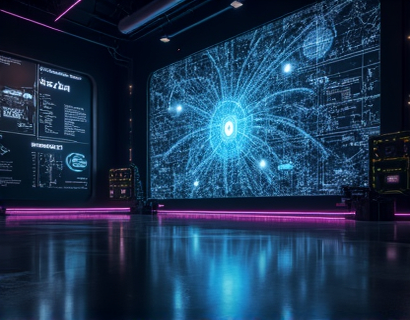Elevating Music Industry Insights with AI Chat Interfaces
The music industry, known for its constant evolution and dynamic nature, presents both opportunities and challenges for professionals and enthusiasts alike. In this rapidly changing landscape, staying informed and navigating efficiently is crucial. A revolutionary approach to accessing expert knowledge and real-time trends is through the use of an AI chat interface. This technology offers an unprecedented level of convenience and depth, empowering users to confidently explore and understand the complexities of the music industry.
Understanding AI Chat Interfaces in Music Industry
An AI chat interface is a sophisticated tool that leverages artificial intelligence to simulate human-like conversations. In the context of the music industry, such an interface can provide instant, reliable insights and knowledge. This technology is designed to understand and respond to user queries with precision, making it an invaluable resource for music professionals, enthusiasts, and businesses.
The core functionality of an AI chat interface lies in its ability to process natural language input and generate relevant, context-aware responses. This capability is particularly beneficial in a field as diverse and intricate as the music industry, where users might seek information on a wide range of topics from industry trends to service recommendations and expert advice.
Real-Time Access to Industry Trends
One of the most significant advantages of using an AI chat interface in the music industry is the real-time access to current trends and developments. The music landscape is constantly shifting, with new genres emerging, artists gaining popularity, and listening habits evolving. An AI chat interface can aggregate and analyze vast amounts of data from various sources, including social media, streaming platforms, and industry reports, to provide users with up-to-date insights.
For instance, a music industry professional might ask the AI about the latest streaming trends or the rise of a particular genre. The AI would quickly process the query and provide a detailed analysis, supported by data visualizations and relevant examples. This immediate access to timely information enables users to make informed decisions and stay ahead of the curve.
Expert Knowledge at Your Fingertips
The music industry is rich with expertise, ranging from music production and marketing to legal and financial aspects. Navigating this expertise can be daunting, but an AI chat interface simplifies the process. Users can engage in conversations with the AI, asking specific questions about various topics and receiving answers from experts in the field.
For example, a music producer might inquire about the best practices for mixing and mastering tracks in different genres. The AI would draw on a database of expert advice and case studies, providing tailored recommendations and insights. This not only saves time but also ensures that users receive high-quality, professional guidance.
Personalized Recommendations and Insights
Another powerful feature of an AI chat interface is its ability to offer personalized recommendations based on user preferences and behavior. Whether you are a music enthusiast looking for new artists to discover or a business owner seeking to expand your client base, the AI can curate a list of tailored suggestions.
For music professionals, this could mean receiving recommendations for collaborations, upcoming events, or emerging talent that aligns with their interests and goals. For businesses, the AI might suggest marketing strategies, content ideas, or partnership opportunities based on industry trends and user behavior. This level of personalization enhances the user experience and provides actionable insights.
Enhancing Music Education and Learning
The music industry is not only about professional practice but also about education and learning. An AI chat interface can play a significant role in music education by providing interactive learning experiences. Students and aspiring musicians can ask the AI questions about music theory, composition, and performance techniques, receiving detailed explanations and examples.
Additionally, the AI can recommend educational resources, such as online courses, books, and tutorials, based on the user's level and interests. This makes music education more accessible and engaging, catering to a wide range of learners.
Supporting Music Industry Businesses
For music industry businesses, an AI chat interface can be a valuable tool for customer service, market research, and strategic planning. Business owners can use the AI to answer common customer queries, provide service recommendations, and gain insights into customer preferences and behaviors.
For instance, a record label might use the AI to understand the demographics of their fan base and tailor their marketing efforts accordingly. Similarly, a music venue can ask the AI about the best times to schedule events based on historical data and current trends. This data-driven approach helps businesses make informed decisions and improve their operations.
Securing Music Data and Privacy
While the benefits of an AI chat interface are numerous, it is essential to address concerns related to data security and privacy. The music industry deals with sensitive information, including personal data, financial details, and creative content. An AI chat interface must be designed with robust security measures to protect user data.
This includes implementing encryption for data transmission, adhering to privacy regulations such as GDPR, and providing transparent information about data usage. By prioritizing security and privacy, the AI chat interface can build trust with users and ensure a safe and reliable experience.
Future Prospects and Innovations
The integration of AI chat interfaces in the music industry is just the beginning. As technology continues to advance, we can expect even more sophisticated and intuitive interactions. Future innovations might include enhanced natural language processing, emotional intelligence, and integration with other smart devices and platforms.
For example, an AI chat interface could integrate with smart speakers or mobile devices, allowing users to receive music-related insights and recommendations seamlessly throughout their day. This level of integration can further enhance the user experience and make accessing music industry information more convenient.
Conclusion
The introduction of AI chat interfaces in the music industry represents a significant leap forward in how users access and interact with information. By providing real-time insights, expert knowledge, and personalized recommendations, these interfaces empower music professionals and enthusiasts to navigate the dynamic music landscape with confidence and ease. As the technology continues to evolve, the potential for innovation and improvement is vast, promising a brighter and more connected future for the music industry.










































